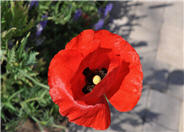
Common name:Flanders Poppy
Botanical name:Papaver rhoeas 'Flanders Field'
This beautiful annual has bright red single flowers, each petal often marked at its base with a large black blotch. Sow seeds in spring. Flanders Poppy is attractive near entries, walkways, and in containers. It can reach 3' tall and prefers full sun in well draining, rich soil. It may re-sow.

Common name:Crape Myrtle
Botanical name:Lagerstroemia indica
The new leaves of this species are 2" long, bright green, and tinged with bronze. Some cultivars have spectacular fall color. When it has a bare outline, its rounded seed capsules add interest. Its delicate flowers bloom in 6"-12" long clusters. The flower colors could be shades of red, rose, pink, purple, and white, blooming in summer. It thrives on heat, and new cultivars have been created that resist mildew. This tree prefers full sun and has low watering needs once it's established.

Common name:Mexican Evening Primrose
Botanical name:Oenothera speciosa
Oenothera berlandieri is a perennial. Grows 10"-12" high, with profuse showing of 1.5" rose pink blooms in summer. Flowers open in daytime and stems die back after bloom. Can be highly invasive.

Common name:Mexican Bush Sage, Mexican Sage
Botanical name:Salvia leucantha
The Mexican Sage is a bushy shrub that grows 3'-4' tall and wide. It has hairy white stems, grey-green leaves and velvet-like purple flower spikes that bloom summer through fall. This shrub tolerates sun, light shade, little water, and is hardy to 15 degrees F. The Mexican Sage attracts hummingbirds. Be careful not to overwater. -Cornflower Farms

Common name:Tree Roses
Botanical name:Rosa Tree varieties
Tree roses are actually shrubs that have been grafted or grown in a way that looks like a tree, ie with a trunk. Tree roses can be floribundas, hybrid teas, or grandifloras. They are typically used as specimen plants. Make sure the plant is tied to a stake in case of strong winds.
Putting the right plants in the right places in the right groupings is both the challenge and art of good landscape design.
Click in the green box for more information
Designer:
Photographer: GardenSoft
Incorporate compost 6" into your soil to retain water, reduce compaction, feed earthworms, and provide valuable nutrients to your plants.
Attract, or buy beneficial insects such as ladybugs and lacewings to control pest outbreaks in your garden.